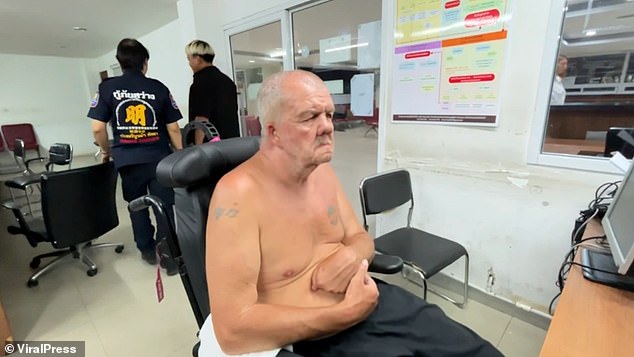A widow fled court in tears during a dramatic inquest where she was all but accused of causing the death of her much older husband – who she’d married just a day before his death and buried with ‘undue haste’.
Lawyers for Lisa Flaherty, 50, said she had been ‘hauled over the coals’ during the three-day inquest as the family of Joseph Grogan, who was 75 at the time of his death, vowed to challenge their short-lived marriage.
The barrister representing three of Mr Grogan’s cousins, Damien Tansey cast doubt over Ms Flaherty’s claims her late husband was suffering from inoperable, stage 4 cancer, as he dramatically declared: ‘None of that evidence is true or accurate.’
He also told the court that Ms Flaherty’s claim their relationship began when she was 16 and put the deceased in the ‘realm of being a paedophile’ and had caused great upset to his family.
The three-day proceedings at a court in Tullamore drew to a close on July 16 as coroner Raymond Mahon recorded a narrative verdict in the case of Mr Grogan, who was suffering from cancer and died just a day after getting ‘secretly’ married to his carer Ms Flaherty.
Mr Mahon dismissed suggestions by barristers for Joseph Grogan’s family that the gardaí should conduct a thorough, forensic investigation before he reached his decision.
The court heard Mr Grogan, 75, was being treated for cancer but had been responding well to treatment. He died at his home at around 3pm on April 15, 2023, the day after attending a registry office to marry Ms Flaherty, 50.
Within hours, his body was embalmed, making it virtually impossible to determine a definite cause of death, Mr Mahon noted. Mr Grogan was a well-known figure in the farming community, and hosted the National Ploughing Championships between 2016 and 2018.
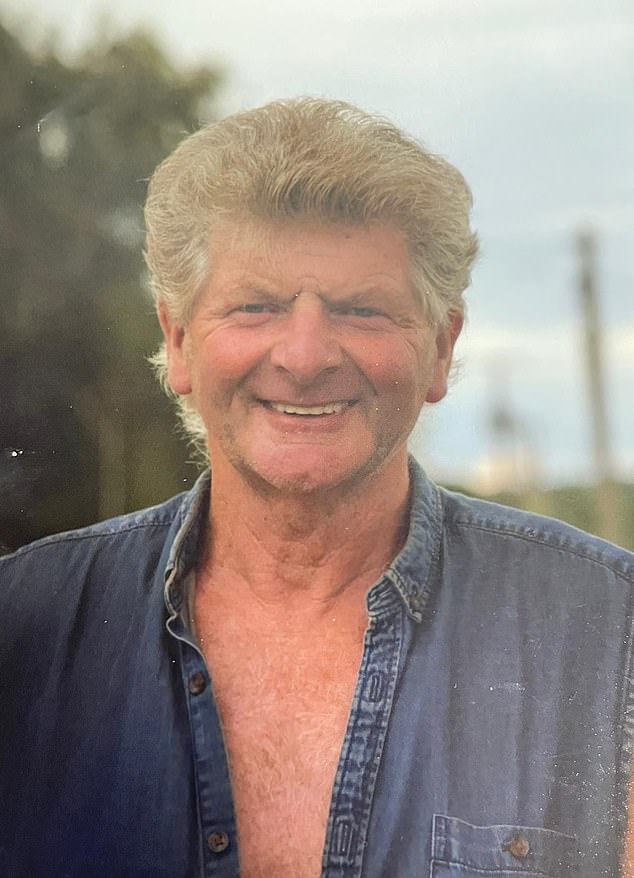
Lawyers for Lisa Flaherty, 50, said she had been ‘hauled over the coals’ during the three-day inquest as the family of Joseph Grogan (above), who was 75 at the time of his death, vowed to challenge their short-lived marriage
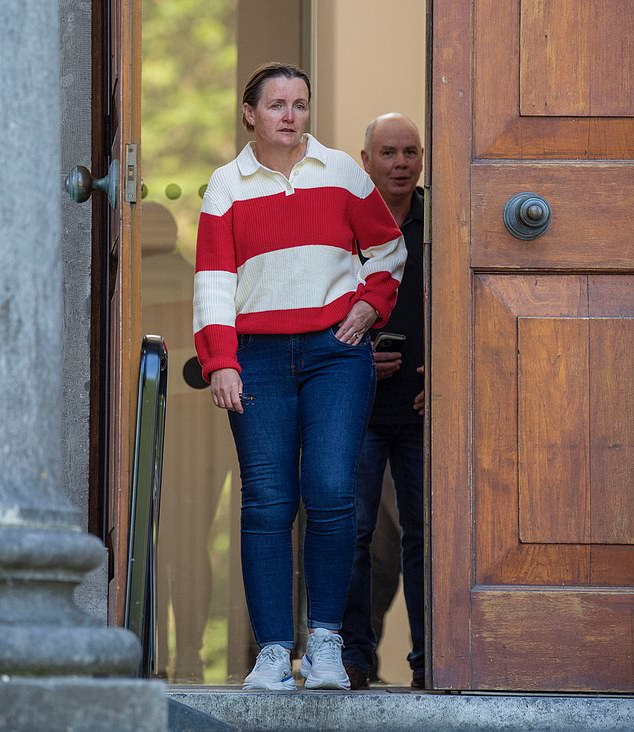
Lisa Flaherty fled the court in tears after she was all but accused of causing the death of her much older husband
His estate, which school SNA Ms Flaherty now stands to inherit, is valued at €5.5million. Mr Mahon said Mr Grogan was diagnosed in early January 2023 with stage 4, aggressive , high grade non- Hodgkin’s lymphoma.
He said he had suffered infections after two of his four rounds of chemotherapy, and that Mr Grogan was said by his oncologist to be vulnerable due to the chemo and his significant weight loss.
He said Mr Grogan’s death was due to a ‘probability of infection’, his immune system having been compromised. Mr Mahon said there were ‘valid concerns’ about Mr Grogan’s care, but said it must be borne in mind that Mr Grogan was very reluctant to see a doctor.
He said it had been a very difficult and distressing case, and commiserated with both the Grogan and Flaherty families.
Mr Mahon had ruled on day one of the three-day inquest that he would not make any decision about the validity of the marriage.
Earlier, Damien Tansey, barrister for three first cousins of Mr Grogan, Alo, Margaret and Seán, called for the case to be referred to the Director of Public Prosecutions, for a forensic examination by the gardaí.
He told the coroner that it was open to him to record a verdict of unlawful killing, which he said could arise from omission or commission.
In his closing submission, Mr Tansey said it was clear that Mr Grogan was very ill between April 5, when he finished his fourth round of chemotherapy, and April 15, when he died.
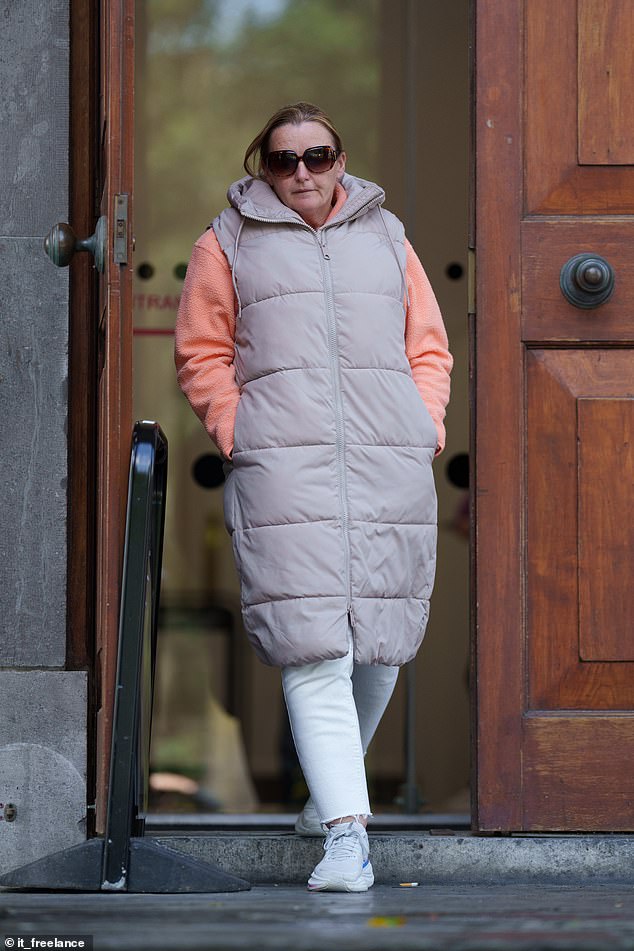
The barrister representing three of Mr Grogan’s cousins, Damien Tansey cast doubt over Ms Flaherty’s claims her late husband was suffering from inoperable, stage 4 cancer, as he dramatically declared: ‘None of that evidence is true or accurate’
He said that without medical intervention during that period, the consequences could be ‘dreadful’.
‘Was he properly treated during that ten-day period?’ he asked. ‘…The only intervention during that ten-day period was to hurriedly and secretly arrange a marriage by which she [Ms Flaherty] stood to gain an estate valued at €5.5million.’
Mr Grogan’s ‘sudden and unexpected’ death had caused disquiet in the local area and in the medical community, he said.
He suggested that those concerns had not been assuaged during the three-day inquest.
Mr Grogan’s oncologist had testified that Mr Grogan’s cancer was responding well to treatment, and the pathologist had confirmed that cancer had not been the cause of death, and neither was organ failure.
Mr Tansey said the swift embalming procedure meant that the pathologist could not test for drugs in Mr Grogan’s system. However, pathologist Charles d’Adhemar had warned that if the three medications Mr Grogan had been prescribed were not administered correctly, it could depress his respiratory and nervous systems.
The ‘star witness’ in the case, Lisa Flaherty, had repeatedly spread a narrative that Mr Grogan had an inoperable, stage 4 cancer and was at the end-of-life stage, awaiting palliative care, Mr Tansey said. ‘None of that evidence is true or accurate,’ he said.
He also noted that she had told the inquest she had been in a long-term relationship with her neighbour Mr Grogan, when she had other partners, and three children who were not Mr Grogan’s.
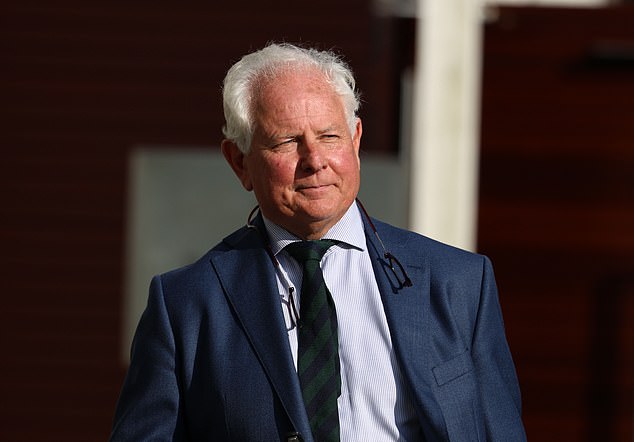
Coroner Raymond Mahon (above) recorded a narrative verdict in the case of Mr Grogan
Her suggestion that their relationship began when she was 16, which ‘puts Joseph Grogan into the realm of being a paedophile’ had caused great anxiety to the Grogan family, he said.
He continued: ‘The troubling issue in this case is the secrecy of the marriage… her own sister did not know about it until the following day. Her best friend did not know until the following day. And she put a notice on the door of the house saying “No visitors”. What was that about?’
He said that less than 24 hours after the ‘secret marriage’ there was the ‘unlawful removal of the remains from the house’.
Peter Jones, a solicitor representing Teresa Mooney, Mr Grogan’s 90-year-old aunt, called for an open verdict, and for the gardaí to investigate.
He said the inquest had left ‘an awful lot of unanswered questions’. He also pointed to the ‘undue haste’ with which he said Mr Grogan’s remains were taken to be embalmed, and to the contradictory evidence given by Ms Flaherty about Mr Grogan being at the end of his life, and awaiting palliative care.
The Grogan family had been excluded during the ‘reign of secrecy’ of Ms Flaherty, he said. They had to learn of Mr Grogan’s death from a friend, which he said showed ‘cruelty’.
‘My client is concerned for justice for Joseph Grogan,’ he said.
‘Despite the best efforts of this inquest, we are no closer to knowing the way or circumstances of this death.’
He said there was a need to ‘satisfy public disquiet’, adding that most people on the street would be concerned to hear that a man had died the day after getting married, ‘and was embalmed by teatime’.
Stephen Byrne, for Ms Flaherty, said Mr Tansey had all but accused his client ‘of causing the death of the late Mr Grogan’.
He said he had been concerned that the inquest would be used ‘to attack the good name and reputation of Ms Flaherty’, and that this had proved to be the case.
He said an inquest could only be adjourned for further investigations to be carried out on the basis of valid, legitimate suspicions, and said that threshold had not been reached.
Other friends and family of Mr Grogan could have gone over the head of his carer, Ms Flaherty, and called a doctor themselves if they were concerned – but they did not, he said.
Instead, he said, the person who cared for him and ‘stepped up to the plate’ had been ‘hauled over the coals’.
‘It is easy for people who did not step up to the plate to instruct their lawyers to come in and criticise someone who did step up and take responsibility,’ Mr Byrne said.
Mr Grogan himself was reluctant to seek help or see a doctor, he said, and that was his own decision.
‘He knew his own body, and he knew he was not going to beat this [cancer],’ he said.
Niamh Higgins, Ms Flaherty’s sister and neighbour, told the court that she was a psychiatric nurse with an additional qualification in palliative care.
She said her mother had called her early on the day of Mr Grogan’s death, telling her that his condition was deteriorating, and that she had gone up to the house.
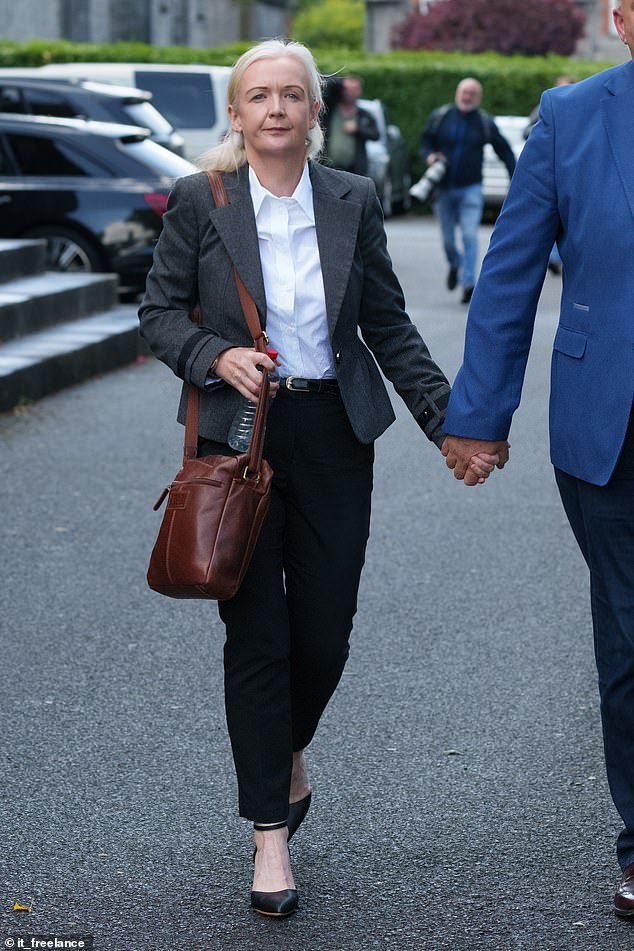
Niamh Higgins, Ms Flaherty’s sister and neighbour, at Tullamore Court for the inquest into Mr Grogan’s death
Mr Grogan was in bed, and appeared to be comfortable and not experiencing any pain or distress, she said.
Ms Flaherty told her that she had called an ambulance at around 10.30am, as Mr Grogan’s condition had rapidly deteriorated.
She said she was told the paramedic had advised that palliative care in hospital would not be available until the Monday, and that Mr Grogan had said he wanted to stay at home.
She said she advised her sister that the MIDOC doctor-on-call service should be called, and that Ms Flaherty agreed, but asked her to make the call, which she did at around midday.
By this time, she said, Mr Grogan’s pulse was irregular and weak, his breathing was shallow and he was less responsive. At 3.48pm, she said, she could no longer detect a pulse.
Ms Higgins told the inquest that she learned of her sister’s marriage after Mr Grogan’s death.
Mary Coyne, a friend of Ms Flaherty and Mr Grogan, said he had told her of his marriage on the morning of his death.
She said that he had said, in a low voice, ‘I have news, we got married.’
Seán Grogan, a cousin of Joseph Grogan, from Naas, Co. Kildare, said that when he saw Joseph shortly before he died, his cousin had one eye closed, and one eye only half open.
His head was leaning to one side, and he was limp, he said.
He said that Mr Grogan had been a confirmed bachelor, who had previously had a 23 or 24-year relationship with a local woman, but had never expressed an intention to get married.
Pádraig Grogan, another cousin who ran a neighbouring farm and saw Joseph Grogan regularly, said he had been on holiday in the US when Mr Grogan died.
He said his wife had sent text messages to Ms Flaherty to stay in touch, but there had been no response on August 14 or 15. They learned of Mr Grogan’s death on RIP.ie, he said.
He had understood that his cousin had inoperable cancer and that there was no hope in his final months, he said.
‘I would have loved to have known then that his results were so good from the oncologist, and to make sure that he knew it,’ he told the inquest. ‘Joe wanted to live.’
Speaking following the verdict, Mr Tansey said that the focus of the Grogan family would now be on the validity of the marriage – which may involve a High Court challenge.
Martin Keyes – a lorry driver, part-time undertaker and family friend – told the inquest he had taken the body to be embalmed just over four hours after Mr Grogan’s death.
He said he had been told by Mr Grogan’s wife, Ms Flaherty that a doctor had released the body for the funeral.
He agreed he had not seen a death certificate for Mr Grogan, who he had known since he was a child.
He said he knew now, having attended the inquest earlier this month, that the doctor on call could not have given his consent for the body to be removed, as he was not Mr Grogan’s treating GP.
He also agreed that he had not reported the death to the gardaí or the coroner on the day it happened, as was his legal responsibility.
He said he was not a member of the Irish Association of Funeral Directors, the rules of which state an undertaker requires medical confirmation of death. He said he was not regulated by any organisation.
‘Why did you remove the body with such indecent haste to be embalmed?’ Mr Tansey asked him.
He replied: ‘There was no haste. It was about 7.30pm by the time I took Joe Grogan to Longford. He died at 3pm I think.’
Mr Tansey put it to Mr Keyes that Mr Grogan’s death was ‘sudden and unexpected’ and the coroner had been sufficiently concerned to instruct the gardaí to go to Mr Grogan’s house and escort the body to the Tullamore mortuary for a post-mortem examination.
Asked why he had gone to Longford, when the court had heard there were other, closer embalming services, Mr Keyes replied: ‘That’s who we use.’
He said the undertakers had not asked him for any paperwork.
Mr Tansey asked: ‘You know that embalming destroys tissues and so on in the body, such that it renders the post-mortem almost non-effective?’
Mr Keyes replied that he did not know much about embalming before the inquest.
He agreed that he now knew that the pathologist had been inhibited from finding the cause of Mr Grogan’s death, and from determining if any drugs had caused his death. However, he said that what he had done was ‘normal standard practice’.
Mr Keyes said he had attended about 100 funerals in the 15 years he had worked as an undertaker, but just two in 2023 before Mr Grogan’s death, on Saturday, April 14.
Mr Keyes said Mr Grogan’s funeral had originally been arranged for the Monday, April 16, but that the date was put back following the coroner’s intervention.
He said he had been asked to be the undertaker for Mr Grogan by his father, who was a close friend of the deceased
He said he had known Mr Grogan himself since he was a child


